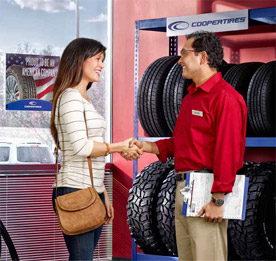Professional Morris Tire and Alignment: Improve Your Lorry's Performance
Wiki Article
Tire Solution: The Effect of Weather
When it concerns making sure optimum performance and security on the road, comprehending the impact of weather problems on tire solution is crucial. From scorching warmth to icy roadways, each weather condition component can dramatically influence tire capability and total driving experience. By delving right into the impacts of varying weather on tires, drivers can get useful insights that might enhance their lorry's performance and longevity. In this discussion, we will explore the intricate relationship in between weather problems and tire solution, clarifying the value of weather-specific tire maintenance practices and considerations.Heat and Tire Efficiency
When revealed to heats, tires experience changes in performance that can substantially impact car safety and security and handling. The heat created from extended driving or heat problems triggers the tire rubber to soften, leading to decreased walk life and raised wear. As the rubber becomes softer, the tire's hold when traveling reduces, impacting stopping distances and total grip. In extreme instances, extreme warmth can even cause tire blowouts, positioning a serious safety and security risk to the car and its owners.Furthermore, high temperature levels can increase the procedure of tire aging, triggering the rubber to degrade much more promptly. This can result in fractures, bulges, and various other types of damage that endanger the architectural honesty of the tire. To alleviate the results of warm on tire performance, vehicle drivers ought to regularly check their tire pressure, revolve tires to guarantee even wear, and inspect for any indicators of damages. Additionally, making use of tires especially developed to withstand heats can help preserve optimal performance and safety when driving.
Cold Climate Impacts
Winter problems can have a substantial effect on tire performance and safety and security. As temperature levels drop, tire rubber can solidify, causing lowered grip on icy or snow-covered roads. In winter, tires might likewise lose air pressure extra swiftly, which can impact managing and gas efficiency. Furthermore, cold temperature levels can create tire sidewalls to tense, raising the danger of damages from fractures or other roadway threats.
To minimize the effects of cool climate on tires, it is critical to routinely check tire stress and inflate them to the supplier's recommended levels. Utilizing winter months or all-season tires created for winter problems can likewise improve grip and hold on icy or snowy roads - tire shop morris. Proper tire maintenance, including normal inspections for wear and damages, comes to be a lot more essential during colder months to ensure optimal efficiency and safety and security
Rainy Conditions Impact
Tires with damaged treads are extra susceptible to hydroplaning, where a layer of water develops up in between the tire and the road surface area, leading to loss of grip. To fight this, vehicle drivers must frequently evaluate their tires for adequate step deepness and think about spending in tires specifically developed for wet conditions.

Snow and Tire Security
When driving in snowy conditions, having the appropriate tires can make a substantial difference in safety and security and efficiency. Winter tires tire shop morris are created with unique rubber compounds and walk patterns to offer much better grip on snow and ice compared to all-season tires.In addition to utilizing winter months tires, it is crucial to guarantee they are appropriately inflated. Cold climate can create tire pressure to drop, influencing grip and handling (discount tires morris il). Frequently examining and keeping the right tire pressure is important for ideal performance in snowy conditions

Weather-Related Tire Maintenance
When faced with different weather condition conditions, appropriate tire upkeep comes to be a critical facet of car security and efficiency. Weather-related tire maintenance incorporates a variety of methods targeted at making sure optimum tire function and longevity in different weather condition circumstances. One essential aspect of weather-related tire upkeep is tire pressure policy. Varying temperatures can create tire pressure to differ, impacting grip and gas effectiveness. Frequently adjusting and examining tire pressure according to manufacturer suggestions is essential for safe driving in altering climate condition. Additionally, tire tread depth plays a considerable role in handling different weather aspects. Tires with ample tread depth supply much better grip on wet or icy roads, lowering the danger of skidding or hydroplaning. When tread wear gets to a particular deepness is essential for keeping grip and security in damaging weather condition, examining tire step on a regular basis and changing tires. By focusing on weather-related tire upkeep, chauffeurs can enhance safety, improve lorry efficiency, and extend the life expectancy of their tires.Final Thought
In final thought, weather condition problems have a considerable influence on tire efficiency and safety (mopar tire service specials). From warmth impacting tire stress and put on to chilly weather lowering grip, it is necessary to think about the weather when maintaining and using tires.In this conversation, we will explore the detailed partnership between weather condition problems and tire solution, losing light on the significance of weather-specific tire maintenance techniques and considerations.

Report this wiki page